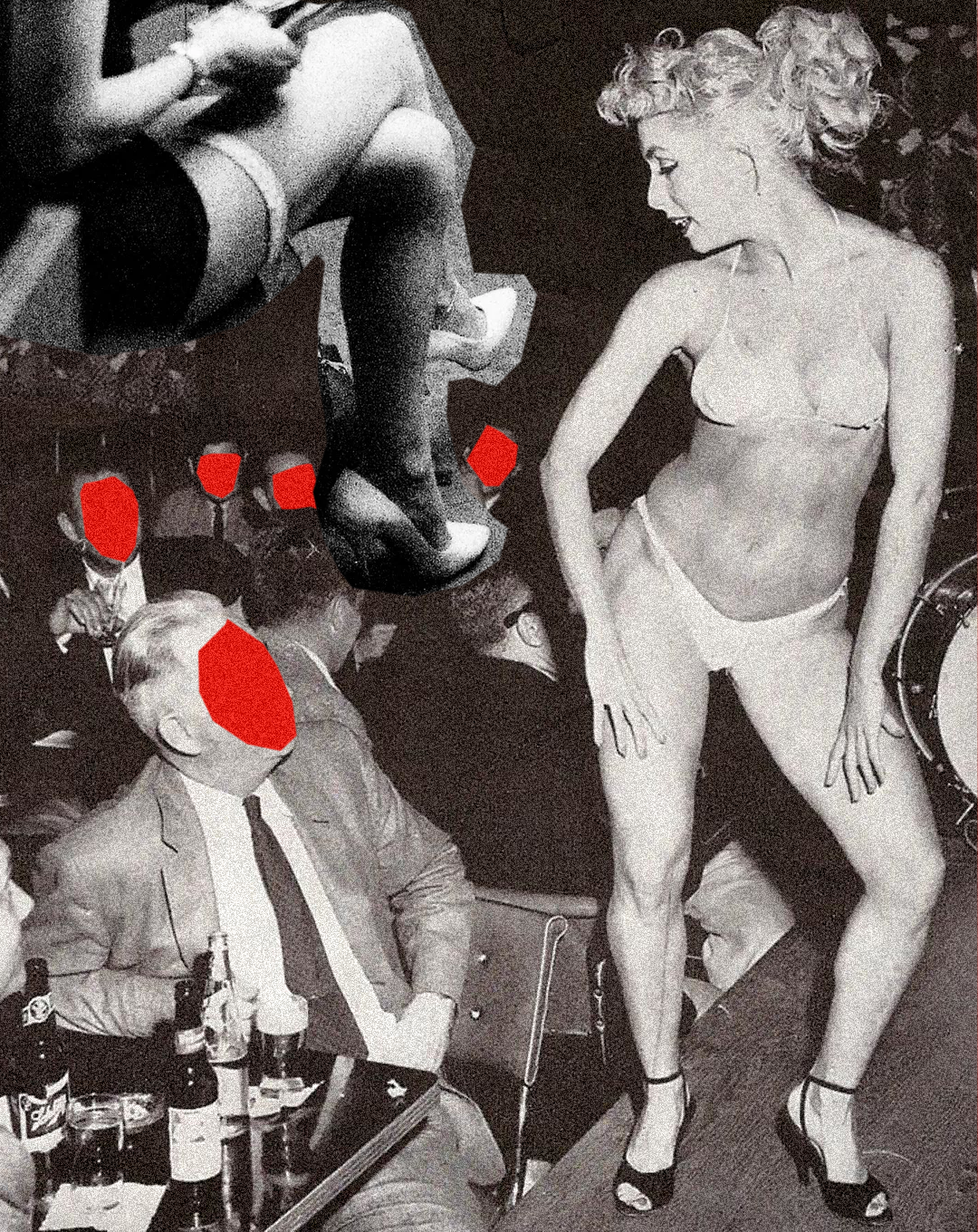Queer Whore Collective: The Appropriation of Sex Work Culture in Queer Nightlife Pt. 1
“Blowjobs are real jobs and real jobs suck” chants a crowd at 2am at a queer clubnight in East London. It isn’t a sex worker protest or march, but a mixed-bill club night run by Queer House Party (QHP). Featured on the night are Cybertease, a self-organised stripper collective formed at the beginning of the pandemic in a bid to create an online platform for dancers to earn while the clubs were shut.
Cybertease imagine a future exempt from exploitative strip club bosses, extortionate house fees, unfair fines, and lack of workers rights. Tonight they are go-go dancing in harmony with call-and-response rallying cries such as "sex work is real work", delivered to club goers by a host from QHP. There is something powerful about a crowd of 400+ dancing to the beat of sex worker rights.
Earlier in the evening, Cybertease hosted their own section, where each dancer from the collective performed an act, followed by a group dance to Rihanna's “Bitch Better Have My Money”, a favourite strip club anthem. Red umbrellas at the ready (a global symbol for sex worker rights), the dancers opened them in time with the drop of the song, allowing hundreds of fake dollars to rain over them.
There is long-standing solidarity between the sex work and queer communities; one born out of being othered, misunderstood, and ignored by society. Historically, they have been at the forefront of each other's respective rights movements, as in the case of Sappho, the lesbian organisation supporting the English Collective of Prostitute's occupation of a Kings Cross Church against unfair policing, or with sex workers being pivotal during the aids crisis in the 80’s. Alongside this, a large portion of the sex work community identify under the queer umbrella.
With this in mind, you can see how Queer House Party x Cybertease represents a powerful alternative future. One free from the stringent rules and culture of traditional strip clubs, or within cishet normativity more generally, which privileges certain body types, or being fully shaved, or performing femininity. This is nightlife where communities unite, campaign for their rights, and dance free from the male gaze.
Step into a strip club in 2022 and you will hear from the dancers that the industry is not what it once was. “I came in and there were 30 dancers to 10 customers. Unless you have regulars you’re barely breaking even.” Isabella, who works in a popular Central London club explains. Previously a lucrative way to earn a living and a viable alternative employment option for working class women, stripping is now an ongoing struggle to break even after paying house fee* at the end of the night.
*The house fee is the charge dancers pay to work at the club, alongside a number of other fees which vary club to club but can include: commission for dances and VIP’s (longer sessions), rental of VIP rooms, fines for uniform, lateness or sickness, and card transaction fees.
At first glance you could conclude that the state of the industry reflects the economy, one that has crashed in the face of a global pandemic and a poorly run government. While that may be true, there is also a targeted war on sex workers.
‘Feminist’ campaigners have been pushing since 2010 for local councils to strip venues of their Sexual Entertainment Venue (SEV) licenses, with the argument that they are hotspots for the exploitation of women. An ongoing battle for a number of years, it has seen the number of strip clubs in the UK drop from 350 to 150. Most recently, we saw Bristol Sex Workers Collective win their well-fought but exhausting campaign to keep Bristol’s only strip club open. Lobbyists in opposition of the club argued that the SEV licence was encouraging violence against women walking past the club at night.
Had the club actually been closed down, true violence against women would have ensued. It would have meant loss of jobs, destruction of a community, and the workers potentially being forced into more dangerous forms of sex work.
Often, sex work is a job picked for its flexibility around disability, mental health, childcare, and other pressures or commitments. Plus it is accessible despite your educational background. Contrast this with the gruelling reality of selling your time for minimum wage for 50 hours a week and you can see why many favour sex work despite the challenges currently facing the industry. Taking that into account, it is clear that nights like Queer House Party x Cybertease are positive for dancers. However, some sex workers have expressed discomfort with the commercialisation of sex worker culture in queer spaces.
“Sex workers have been fighting local councils for years, yet kink nights either fail to support campaigns or are the first to draw a clear distinction between the two in fear of associated stigma, despite the presence of sex worker culture within such parties.”
“Lots of queer club nights are now featuring gogo dancers and pole performers. It sells tickets. But when the promoters have no lived experience of sex work, then it can come with lots of other problems. For example I worked for one event where the promoter just uploaded pictures of me on their social media, face out without checking first. I’m not out to my family, and I have another vanilla job.” Mia, a 25 year old dancer explains. “The stigma that comes with stripping means I don’t have that luxury of waiving my anonymity. Alongside this you will find that some nights hire pole performers with no previous experience of actual sex work. Which is fine, but sometimes it feels like civilians are taking opportunities from those of us who have served time in the industry.”
Furthermore, there is a duty of care that promoters must consider when working with the sex work community. While it might seem like a fun night out for some, for many this is a reality stained with violence and life-altering risks. This could be anything from: family disownment, job loss, or damage to reputation which could prevent access to other forms of future employment.
Mia went on to say that “It feels like they just get to be tourists in our world, scream ‘sex work is work’ for woke points, throw tipping dollars while screaming yasss queen and then go home and do absolutely nothing towards campaigning for our rights. It’s performative. But when you pair this with a crowd who are also wearing your work uniform. It makes you angry. They are literally playing dress up in our world”.
Log-on to any fast fashion brand and you will find most-wanted pages littered with 'stripper dresses'. Scroll on TikTok and you'll see girls sharing storytimes in skimpy outfits that were once only seen in the interior of a strip club. Wander down to your local mainstream club night and witness women sporting Pleasers (stripper heels), sold to them as clear heels for £25 on Pretty Little Thing.
There has been discourse within the kink community about whether it is acceptable to wear Pleasers. Emily, a 29 year old sex worker and a regular within the kink scene in London, explains, “Kinky people tend to think because they're ‘sex positive’ they can make a lot of assumptions about sex work and even associate their experience with ours. Choosing to wear them for a little try-on and dance around then take them off after your feet start to hurt is not the same as being told to wear them for a 10 hour shift and not being allowed to sit down if people are in the club. People like to appropriate our aesthetic but when our workplaces are getting shut down and our rights are threatened it's usually crickets from them”.
It is understandable why Emily feels uncomfortable with the appropriation of sex worker culture in kink spaces, as it carries a burden that civilians will never share nor understand. In The Ethical Stripper, Stacey Clare explains that dancers can be detained and refused entry to a country by border control officials just for carrying Pleasers in their luggage.
Clare also explains in her book that kink parties have historically distanced themselves from campaigns by strip clubs to retain their SEV licence as they do not want to be associated with lap dancing. In 2010, a campaign emerged to fight against Hackney City Council attempting to shut down all of the strip clubs in the East London borough by revoking all of their licences. Dancers stood alongside the venues, becoming a voice for the women that worked there. A group of dancers asked for the support of one of London's most infamous fetish parties, Torture Garden, as well as other similar kink nights, but they all refused to comment.
Similarly, in the past few months Klub Verboten have been under scrutiny for the lack of support and solidarity they have shown sex workers when running a campaign to retain their SEV license in the borough of Tower Hamlets. Karl, the founder of Klub Verboten, said in a published statement that, “This type of condition was designed to stop unlawful lap dancing in venues across the borough, and not prohibit informed, consensual adults from nudity in safe and well-monitored venues”.
Sex workers have been fighting local councils for years, yet kink nights either fail to support campaigns or are the first to draw a clear distinction between the two in fear of associated stigma, despite the presence of sex worker culture within such parties.
Alongside the fact that civilian attendees dress up in sex worker attire, kink parties also profit from the large proportion of sex workers that attend their events. With this in mind, it is shocking that they fail to show solidarity toward sex workers when they are campaigning for the exact same thing.
Furthermore, it is unacceptable to take from a community without actively giving back, or in the very least being vocal in support for sex worker rights (and preferably outside of a nightclub and/or an Instagram repost). We need the full decriminalisation of sex work, fairer working conditions, and legislation that makes discrimination against sex workers in any form illegal.
END OF PART ONE, STAY TUNED FOR PART TWO NEXT MONTH!
Maedb Joy is an artist making political work across poetry and theatre based in London. She is the founder and co-artistic director of Sexquisite Events.
Instagram:@sexquisite.events | Twitter:@sexqusitevents | Website:https://www.sexquisiteevents.com


